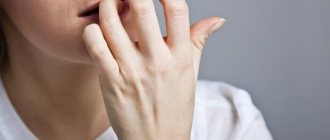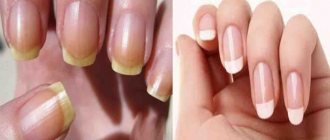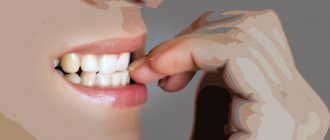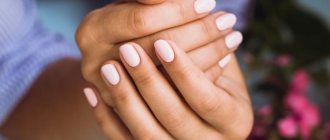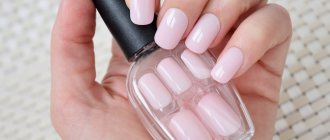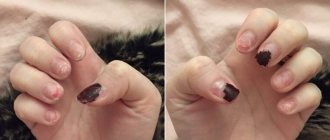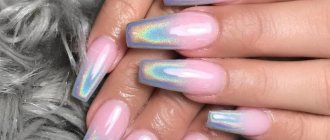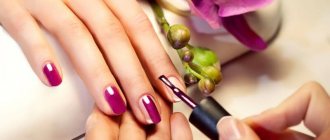The habit of biting nails is not limited to small children.
Often she remains both in adolescence and in adulthood - recently photographs of the British queen herself, caught by the paparazzi doing something inappropriate for a royal person, went viral.
The luminary of Russian poetry A.S. committed similar sins. Pushkin - Arina Rodionovna tied his hands.
And the queen of American pop, Britney Spears, a singer with a gnawed manicure, we regularly see.
And if at 10 or 11 years old you can still somehow justify this and wean the child from a bad activity, then at 30 it can significantly spoil life.
Just imagine how you apply for a job and hand over your resume with a hand with bitten nails.
It is unlikely that the employer will rush to the HR department with him, even considering the impressive list of your achievements.
Let's figure out what causes this habit and how to stop biting your fingernails at home.
Occupy your mouth
If you are not interested in new hobbies, then you should think about what you can do to occupy your mouth. Unfortunately, constant snacking is not suitable for everyone, as it can significantly affect your figure. Try chewing gum, and if you don't like it, keep mints or other candies on hand. Every time you find yourself wanting to bite your nail, eat one of the lollipops.
Over time, candy can be replaced with a bottle of water. In this case, you should take a big sip after every thought about biting your nails.
At 13 years old
It is useless to force thirteen-year-old teenagers to do anything by force and to impose your opinion and vision of the problem on them. If a girl has a bad habit, then her mom can sign her up for a manicure and ask the master to explain how to properly care for her nails.
As soon as a young girl sees the result of a professional’s work, she is unlikely to want to return her nail plates to their former poor appearance and will strive to take care of them.
As for boys, parents can give them an expander or some kind of board game so that he can occupy his hands.
Recommendations from psychologists
It is not always possible to discover the cause on your own, so parents can turn to a psychologist if, in addition, numerous attempts at weaning have not led to any positive results. Many psychotherapeutic tips are widely known, but they should still be repeated.
- You cannot scold or shout at a child, since such an aggressively expressed interest in a child’s problem, on the contrary, will aggravate the situation. Some kids will become even more nervous, others will begin to bite their nails out of spite. It is better to look for a more positive way to help your child.
- You should definitely talk to your child to establish the “trigger mechanism.” Sometimes methods that reveal subconscious and hidden problems help to discover the cause. For example, you can invite your child to draw a school lesson, friends, and household members. Black colors and obvious negativity indicate a problematic area of life.
- Try spending more time with your little “rodent”. Physical contact is required (patting the head, hugs, finger massage), pleasant words, discussion of pressing problems. That is, the hours and minutes spent with the child must be filled with positive emotions.
- Self-care is necessary to demonstrate positive behavior patterns. It is foolish to expect a child to refuse to bite off nail plates or hangnails if one of the close relatives (especially those who are significant to the child) bites their nails themselves and constantly pushes their fingers into their mouth. Teach a girl to take care of her nails!
- If a child expresses aggression in such an undesirable way, show him socially approved forms of its manifestation. For example, visiting sports clubs, various competitions, and contact games contributes to the splashing out of negative emotions that are no longer directed towards one’s personality.
- Keep your child busy with manual labor, for example, drawing, sculpting, working with scissors, burning will not only keep his hands occupied, but will also bring a lot of positive moments to the baby. Cross stitch is suitable for older girls. In addition, textured objects - stones, construction parts, pimply balls and other small things - help relieve stress.
- It is necessary to talk about negative consequences - unpleasant stories often have the desired effect on older children. Teenagers can independently find various “horror stories” on the Internet in the form of photographs of parasites that grow in the gastrointestinal tract. A small child can be asked to examine through a microscope the dirt from under the nails, which may contain various unpleasant creatures.
- An extraordinary approach is needed to a creative child. In particular, you can compose a fairy tale story that tells about two heroes - one bites marigolds, and the second does not have such a habit. That is why few people communicate with the first and play because of unpleasant-looking hands, while the other has many friends. Fairytale therapy has a positive and indirect effect on children's consciousness.
- It is necessary to reconsider the daily routine. Thus, it is important for two-year-old children and older children to provide a comfortable psychological atmosphere and frequent walks outside. Schoolchildren need to be given more free time, without pressure on grades, success and academic workload.
- If the trigger for onychophagia is an unexpected separation from your beloved mother after being with her all the time, then such a separation can become a serious stress. It is important to gradually accustom the child to independence and independence, for example, you should take him to his grandmother or to kindergarten for a short time so that he gets used to being without his mother.
If correspondence advice does not help in any way, you should contact a psychologist or neurologist. Perhaps the child has developed a neurotic state, one of the signs of which is often obsessive movements.
Bitter nail polish
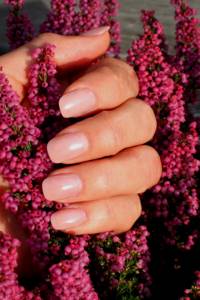
These include a special bitter varnish. This coating is not harmful to the human body, but has an extremely unpleasant taste. When applying a special varnish, try to cover not only the nail itself, but also the skin around it. You can purchase this product in cosmetic stores and pharmacies.
Any tasteless coating can become an analogue of bitter varnish. As a child, your grandmothers often scared you by smearing mustard on your nails. Instead, you can also use any product that is safe for health and has a strong taste.
Take care of your nails
Nail care is a simple but important procedure. Here are the recommendations of dermatologists:
- The best time to trim your nails is immediately after taking a bath or shower.
- Remember to disinfect your tools monthly. Use alcohol for this.
- When trimming your nails, cut the nail almost straight. Use a nail file to slightly round the corners of your nails - this will help maintain their strength and prevent them from snagging on clothing. (Here's a video on how to cut your nails correctly.)
- Leave the cuticle alone. It protects the root of the nail, so it is important not to cut the cuticle or push it back. When you cut your cuticles, bacteria and other germs can more easily enter your body and cause infection.
- Moisturize your nails after trimming to keep your nails flexible. This is especially important when the air is dry, as dry nails split more easily.
Causes
Most experts believe that the main cause of onychophagia is severe stress or psychological trauma suffered in childhood. The reason for stress can be:
- conflict situation in the family;
- parental divorce;
- difficult relationships in children's environment;
- high demands on the baby that he cannot cope with;
- feeling of defenselessness, loneliness.
https://www.youtube.com/watch?v=dTQ8KVO-F80
People who suffered stress or received psychological trauma in childhood often fall into an addiction at a fairly mature age, even with a little anxiety.
In most cases, people suffering from onychophagia experience low self-esteem, self-doubt, shyness and nervousness. For such people, biting nails is one of the effective ways to get rid of anxiety. Some doctors believe that onychophagia can be inherited, that is, if you are diagnosed with onychophagia, then your children will most likely also be susceptible to this disease.
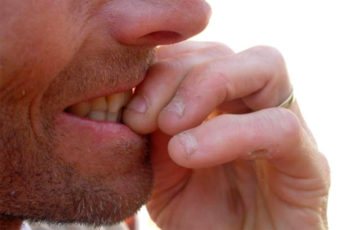
Freud wrote that onychophagia may be a consequence of dissatisfaction with the oral reflex in infancy, for example, if the baby was weaned early or very abruptly weaned off the pacifier.
For infants, the process of sucking brings a feeling of peace and protection, so its deficiency first forms the habit of thumb sucking, and subsequently a tendency to onychophagia.
The habit appears in childhood. A person carries it with him throughout his life. During times of relative psychological calm, it does not manifest itself in any way, but during stress, the hands immediately reach for the mouth. The psychosomatics of onychophagia lies only in psychological problems.
When a baby experiences psychological discomfort, he calms down in this way. At the same time, the feeling of security remains for life and is recorded in the subcortex.
Growing up, an adult unconsciously puts his hands in his mouth as soon as he experiences psychological discomfort. At this time, self-control, help from loved ones, and a conversation with a psychologist will help. It is necessary to understand the essence of the problem and work together to find a solution.
Other causes of onychophagia:
- anxiety;
- guilt;
- obsessive-compulsive disorder;
- trouble in personal space;
- problems communicating with others;
- adopting other people's habits.
Prolonged nervous tension provokes the manifestation of a forgotten bad habit. Particularly sensitive people, unstable in the face of stress, thus build a psychological defense mechanism and calm down during periods of emotional overstrain.

The process distracts a person from the current situation, helps to reflect on it, calm down, think and find the right solution. But not everyone around can understand and accept an adult who bites his nails with pleasure.
Habit
A bad habit does not appear overnight. This is a long process that develops throughout life. Over time, this becomes a reflex - a reaction to mental stimuli.
In childhood, the child is controlled by his parents; later, as he grows up, he must learn self-control. It is important to get rid of the habit as early as possible so as not to look funny and ridiculous.
An adult grows up with this habit, it becomes part of him, and it is almost impossible to eradicate it.
Disease or bad habit?
It is not for nothing that psychiatrists introduced a special definition into medical practice - onychophagia. This term implies a mental disorder (!), which is expressed in an uncontrollable desire to bite the nail plate.
This disorder develops gradually, moving from a seemingly harmless habit.
Surveys have shown that almost a third of children of primary school age are prone to biting their nails, and this habit is much more common among male children.
Then the incidence only increases, since almost half of children bite their fingers during adolescence. This may be due to the increasing psychological stress.
That is, a bad habit cannot be left alone with a child, hoping that he will outgrow it. On the contrary, there is a risk that the problem will simply develop into a mental disorder, which cannot be overcome without the help of doctors.
Therefore, you need to find the provoking factor and, if possible, get rid of it.
Keep hand cream with you
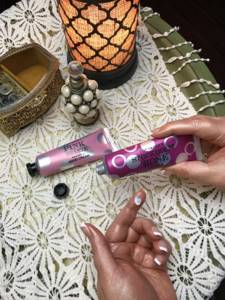
This method is a bit similar to the candy method. Whenever you have the urge to start biting your nails, start using hand cream. This will not only distract you from the bad habit, but will also help keep your skin soft and hydrated. The hardest thing will be to catch yourself thinking that you want to start biting your nails. At first you will rarely notice this urge, but over time you will be able to pay attention to it more and more often.
Why do children and adults bite their nails?
What's interesting is that most children under six years of age never bite their nails.
This habit is formed between the ages of seven and ten and, if not overcome in time, haunts a person throughout his life.
Moreover, according to the observations of scientists, boys are guilty of self-criticism more often than girls.
The reason for this is not at all the love for a beautiful manicure of the fairer sex, but self-doubt, stress, nervous and physical strain, aggression, and anger.
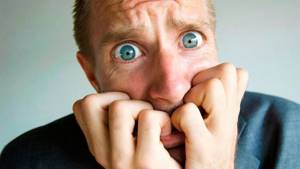
Strong emotions make us bite our nails
Professional psychologists called this habit “onychophagy” and consider it a symptom of obsessive-compulsive mental disorder - increased anxiety was found in 100% of people over 27 years of age.
Let's also add low self-esteem and a tendency to self-digging.
Moreover, the more a person bites his nails, the more he wants to do it - the sight of an unaesthetic manicure makes him scold and hate himself for his inability to resist weaknesses.
Let's add physical harm to psychological harm:
- Bacteria accumulate under overgrown nail plates. The more often you put your fingers in your mouth, the more likely you are to develop an intestinal disorder.
- If you regularly chew on the beautiful shape of your nails, you can’t dream of it; burrs endlessly form around the plates, and biting them ends in inflammation.
- A terrible habit results in problems with teeth - cracked enamel, inflammation of the gums and oral cavity, and actual loss of teeth (need I remind you that, unlike hair, they do not grow back on their own?).
Well, it’s not worth talking about how terrible nail biting looks from the outside and offends those around you.
Therefore, we begin to fight the deficiency in all possible ways.

The problem is psychological in nature
Dermatophagy
This is a disorder in which a person compulsively bites, chews, chews, or eats their skin (most often on their fingers). Such actions, as with trichotillomania, can be conscious or unconscious.

Most often, patients with this disorder bite the skin around the nails, some on the knuckles, which leads to bleeding, pain and calluses. There are cases when the patient chews the mucous membrane on the inside of the mouth, cheeks or lips, due to which blisters appear inside and outside the mouth. At the same time, blisters can make you want to tear off or bite off the affected skin, which is quite dangerous: infection can get into the wound.
Most often, dermatophagia occurs in children, but sometimes it manifests itself in adulthood and can be associated with increased anxiety in a person or the occurrence of unpleasant premonitions, says Oleg Aizberg.
Wear a rubber band on your wrist
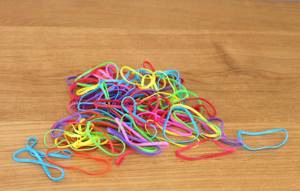
There are two ways to stop biting your nails using an elastic band. Buy a regular rubber band for money and put it on your hand. Set yourself a goal of not biting your nails for a month (or whatever time period suits you best). As soon as you break down and start biting your nails, put the same rubber band on your other hand and start counting again.
Another way: when you have the urge to start biting your nails, pull the rubber band back a little and let it go so that it hits your skin. The blow will not be very painful, but gradually the brain will connect the thought of biting nails and subsequent pain, which means that over time the desire to bite nails will decrease.
How to stop biting fingernails as an adult - psychological tricks
Before smearing your nails with agave or sprinkling mustard, let’s figure out how psychology can be useful.
And if you are still confident that creating a manicure using your own teeth helps you concentrate and make the right decision in a difficult situation, then in fact you are simply in a state of permanent stress.
You need to fight not so much the habit as the cause - worries, bad mood, nervous breakdowns. Ideally, the right solution would be to see a psychotherapist.

Working on your own consciousness will help you cope with the problem.
You can arrange “home therapy” for yourself in the following ways:
"No" to negativity
Learn to drive away bad thoughts and control emotions - do not replay the mistakes of the past day, week or year in your memory, concentrate on the good, praise yourself, keep a diary of joyful memories, add even small positives there.
"No" to anxiety
When bad thoughts begin to overwhelm you, say out loud all your actions: now I’ll make myself some tea, watch my favorite show, go for a walk, bite my nails.
As soon as you say this out loud, you will immediately stop yourself. After 7-10 times of regular practice, a conditioned reflex will begin to develop.
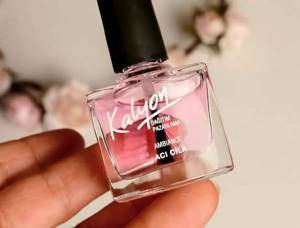
Cover the plates with a special varnish
"Yes" to vitamins
To strengthen your nervous system, take care of not only psychological, but also physical health - eat right.
Eat more vegetables and fruits, take a course of vitamins. The latter quickly strengthen the nail plates and accelerate their growth.
“Yes” to what you love
Pay more attention to hobbies - when you draw, dance, embroider or bake cupcakes, the desire to bite your nails disappears by itself, because your head is occupied with other thoughts.
Supplement psychological techniques with physiological ones:
- Get a beautiful, expensive manicure , and the desire to ruin it will disappear along with the desire to bite your nail plates; if you are a girl, cover the plates with gel polish or strengthen/build them up.
- Find an adequate substitute and try chewing on something else— for example, a toothpick, chewing gum, or buying candy. As a last resort, use a pencil.
- To avoid a relapse, scrub the soap - the unpleasant aftertaste will discourage you from touching your nails with your teeth for a while.
- If your main problem is hangnails, carry nail scissors with you to carefully trim the skin if necessary.
- Allow yourself to be a child and smear your nails with something bitter/spicy - aloe juice, red hot pepper, dry mustard, onion juice, wormwood tincture will do.
- Cover the plates with a special strengthening varnish (these have been sold in pharmacies for a long time, since pharmacology has taken care of those who like to do manicures with their teeth) - its unpleasant taste will discourage the desire to bite nails.
- Don’t forget to motivate yourself and pay attention to the beautiful manicures of those around you. The desire to have one will definitely one day overcome the passion for gnawing.
- As a last resort, cut your nails as short as possible - the shorter they are, the harder it is to bite them.
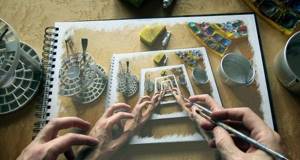
Spend more time on your hobbies
Advice: psychologists say that a bad habit can indicate unfulfilled sexual desires. Work on this side of the issue.
The process of eating nails is especially active while watching TV, so find a more edible replacement for them - popcorn, seeds, straws.
And start working on your consciousness - that’s where you will discover the roots of the problem.
Keep your hands busy with your phone

Oddly enough, but this method really helps. This works especially well with large phone models that are not easy to hold with one hand. If your smartphone is a little smaller, install several games that you can play using only two hands. This way, your brain and your hands will be busy most of the time, leaving fewer opportunities for you to start biting your nails.
How to stop children from biting their fingernails at home
At the age of three years, the habit of biting nails can be an elementary manifestation of the sucking reflex; the baby may be bothered by a hangnail or an overgrown piece of the nail.
In rare cases, this behavior signals a lack of vitamins in the body.
That is why it is especially important for parents to monitor the condition of their child’s hands, so as not to later struggle with the question of how to find an approach and make their child stop biting his fingernails at the age of 7 to 11 years.
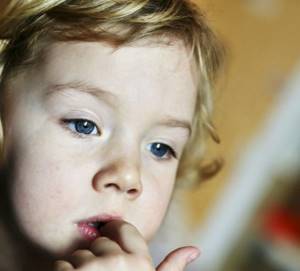
Start weaning your child off a bad habit as early as possible
Such a bad habit can negatively affect not only the health, but also the developing character of the baby, so you need to start fighting it as early as possible.
According to the favorite pediatrician of all mothers, Dr. Komarovsky, the parental manner of scolding for everything pushes them to a bad activity - the kids feel irritated and act out of spite.
Of course, there is no point in doing nothing either.
Here's what might help you:
At 4 years old
— it is better to distract the child from a harmful activity, read a book with him, play his favorite game, let him chew a carrot or an apple.
At 5 years old
— organize a joint procedure for cutting nails, calmly and confidentially tell what this activity may turn out to be in the future.
Tell a fairy tale where a negative character will be endowed with a bad habit, etc.

The older the child, the more difficult it will be to cope with the problem.
Advice: under no circumstances hit your child’s hands or punish him; this will only increase his desire to relieve stress in an ineffective way.
At 6-10 years old
- if you cannot wean your child from a harmful activity, contact a psychologist, since solving the problem on your own will be problematic.
If you are going to use “proven old-fashioned methods” like agave juice or mustard, remember that they can damage the mucous membranes of the nasopharynx.
Gentle educational measures along with praise for even minimal success will yield positive results much faster.
In adolescence, you should consult a psychologist with a problem
Summarize
The habit of biting nails in children is mainly associated with boredom. As soon as you distract them, offer something in return, they lose interest in their own hands.
For teenagers over 12 years old, psychologists recommend looking for an approach from the aesthetic side. It is worth explaining once again that bitten nails look unsightly, or can cause infection or bacteria to enter the body. And this will lead to unpleasant and lengthy treatment.
In order for an adult to give up the idea of biting his nails forever, he needs both friendly and psychological help. It is important to eliminate the causes of increased anxiety in order to quit the bad habit.
Share with your friends!
more
Read us in the Zen channel
Use reminders
It's not just about reminders on your mobile phone or computer screen. Posters encouraging people to stop biting their nails can be posted throughout the house. For example, on the refrigerator or on the bedroom door. It is not threatening inscriptions that work best, but words of support and compliments. Funny drawings will also help, raising your spirits and restoring self-confidence.
If even with short nails you want bright colors and a manicure, don’t deny yourself. Previously, we compiled a list of 30 nail design ideas that can be implemented on small nails. In addition, a beautiful manicure is another reason why you will not bite your nails again.
What to play with a child who bites his nails
Fairy tale. Together, come up with a story about a fictional character who—what a coincidence! - He loved to bite his nails. Take turns with your child and suggest options for the development of events: maybe the character once met a good fairy who waved her magic wand and helped him, or did he suddenly turn into a kitten and long claws simply became necessary for him?
Guessing game. Invite your child to close his eyes and determine by touch the fragment what kind of object you are showing him. Prepare materials of different textures in advance: a piece of sandpaper and suede, a shell, a peeled apple or grape, a massage brush-comb. Then switch: now you close your eyes, and the child will invite you to feel various objects.
Hello little man! Using a cosmetic pencil or washable felt-tip pen, draw faces on the nails of your baby's index fingers. Give the little people names and act out several scenes with their participation: let them visit each other, walk or dance together.
